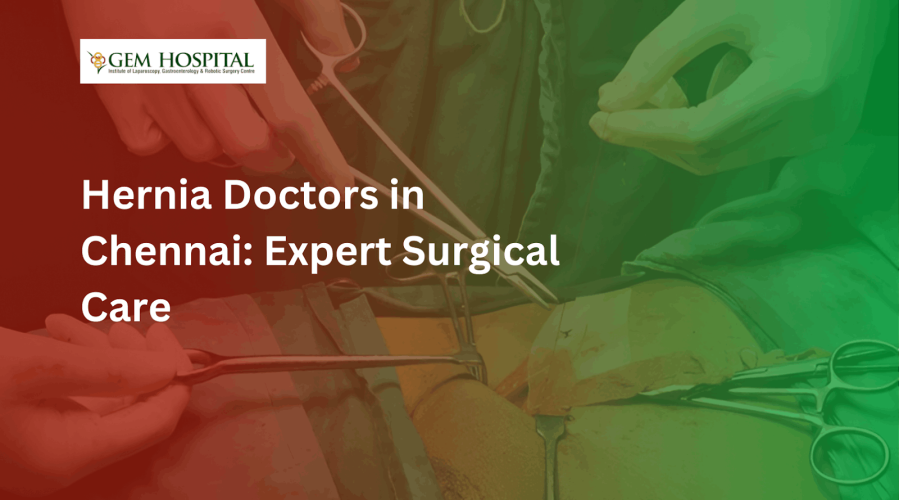Consult experienced hernia doctors in Chennai for expert surgical care. Advanced diagnosis, safe hernia surgery, and faster recovery with specialized treatment.
Post-Hernia Surgery Diet and Exercise Tips in Tirupur

After undergoing hernia surgery, healing is a gradual process requiring patience and discipline. If you had an inguinal, umbilical, or hiatal hernia repaired, taking proper care after surgery can help you heal well, regain strength, and decrease the possibility of recurrence. When seeking post-hernia surgery care while in Tirupur, patients should keep two specific factors at the forefront of their mind at all times: diet and exercise. A focus on both diet and exercise is pertinent to healing, regaining strength, and preventing recurrence over time.
Importance of Post-Surgery Care
Your body at the site of the repair requires sufficient time to rebuild the muscle and tissue that was in the vicinity of the hernia after surgery. Following a well-balanced diet is important for healing, reducing inflammation, and providing the body with proper nutrition for healing. Likewise with exercise, the appropriate exercises can aid in regaining strength and flexibility of the core without placing extra stress on the site of repair. Conversely, if either is neglected, the patient is likely to experience some discomfort, delayed healing, or in rare cases, recurrence.
Diet Tips for Post-Hernia Surgery Patients
The food you consume after surgery is important to your recovery. Since digestion occurs primarily in the abdominal cavity, nutrition should be light, nutritious and easy to digest.
Key Diet Recommendations:
- Start with soft foods:In the first couple of days transitioning into 1 week after surgery, soups, porridge, khichdi, and boiled vegetables is a great choice. This avoids undue stress on the digestive processes.
- High-fiber diet: Constipation is common after surgeryIncorporate whole grains, greens (particularly those high in vitamin K), some fruits (such as bananas and papayas), and pulses into your diet to encourage soft bowel movements.
- Lean proteins: Foods such as fish, eggs, lentils, and chicken provide protein that can help repair tissue and muscles after surgery.
- Adequate hydration: Drink 8-10 glasses of water every day. Warm beverages (such as herbal tea) might help with digestion and reduce bloatedness.
- Hydration:Foods that produce gas, such as beans, cabbage, or carbonated beverages, can increase pressure on your surgical site and bloating.
- Avoid gas-forming foods: Eating 4-5 smaller portions each day would alleviate dyspnea digestion and feeling fullness.
- Small, frequent meals: Eating 4-5 smaller portions each day would alleviate dyspnea digestion and feeling fullness.
- Limit spicy and oily foods: These can irritate the stomach lining and increase discomfort.
Exercise Guidelines After Hernia Surgery
Physical activity should be introduced gradually over time after surgery. The first few days would be important, but inactivity for long periods after can cause muscle weakness and stiffening. You are trying to slowly increase strength without overdoing it.
Safe Exercise Tips:
- Week 1–2: Concentrate on slow walking within the confines of your home in order to promote good circulation to prevent blood clots and conditions from sedentary behavior. Do not lift weight whatsoever.
- Week 3–4:Continue walking and introduce light stretching to exercise your body. In addition, breathing exercises may be incorporated in strengthening your abdomen.
- After 4 weeks:If your doctor clears you, you may begin with light yoga, pelvic tilts, and begin exercises in relation to core stabilization. You would still avoid sit-ups and heavy lifting.
- Long-term care: Gradually increase your activity levels as tolerated. Listen to you body in regard for pain and or swelling at the surgical site, you will stop.
Lifestyle Tips for Faster Recovery
Lifestyle Tips that may Promote Faster Recovery: In addition to diet and exercise, some small changes in lifestyle will help with recuperation and healing.
- Get adequate sleep [try for 7-8 hours of sleep every day].
- Do not smoke and reduce alcohol intake, as these are also hypothesized to slow down the healing process.
- Wear very comfortable clothing that does not put any pressure toward your surgical site.
- Try to stick very closely to your scheduled medications prescribed by your physician.
Bullet Point Summary
- Eat foods that are high in fiber, protein, digestible, and soft foods.
- Hydration with water/hot tea.
- Avoid heavy/bloating foods.
- You may begin your physical movement starting with light walking with slow hand stretching if not clear.
- Do not lift heavy weights without your doctor clearance.
- Sleep (and rest) are very important in recovery, try to schedule some downtime in your day if needed to manage stress.
- Regular followups and surgical visits are strongly recommended.
Finally, proper care post hernia surgery in Tirupur will include dietary suggestions, advancement in physical activity, and better adherence to lifestyle habits. Following these guidelines, patients can hopefully patient/operator should expect to improve healing, reduce symptoms, and reduce the likelihood of future complications.
Whether it is you, or a loved one recovering from a hernia surgery, we recommend checking with an expert medical team related to his or her care.
When looking for a specialized treatment opportunity or out patient, one can obtain additional assistance with regards on the diet, exercise, and long-term care needs — turn you inquiries into Gem Hospital.
The doctors and specialists at Gem Hospital can provide a comprehensive resource to ensure the understanding and guide the appropriate diet, exercise, and long term care follow up.
Book an appointment today, we at Gem Hospital will help you take the first step toward a speedy and healthy recovery.
Blogs & Article
Get advanced liver transplant treatment in Chennai with expert surgeons, modern technology, and comprehensive care for safe and successful outcomes.
Get advanced piles treatment in Erode with expert doctors. Safe procedures, modern technology, and effective care for fast relief and recovery.


